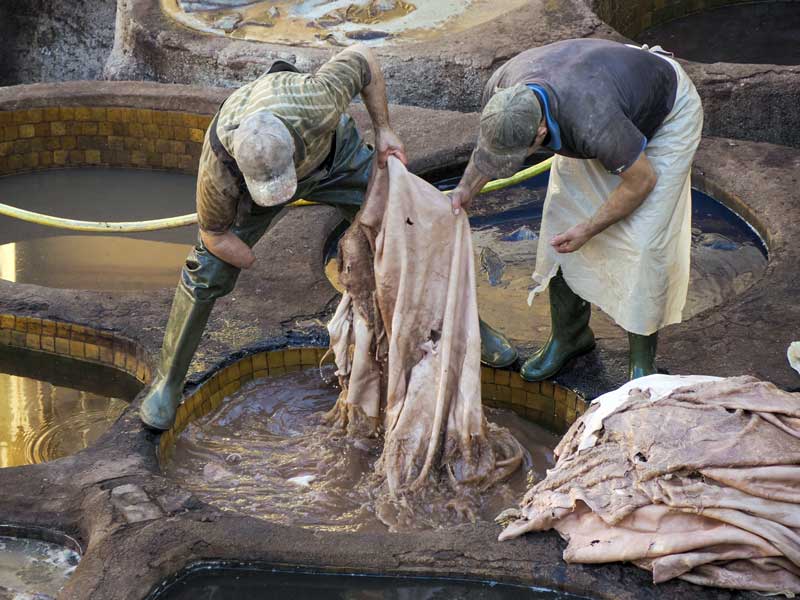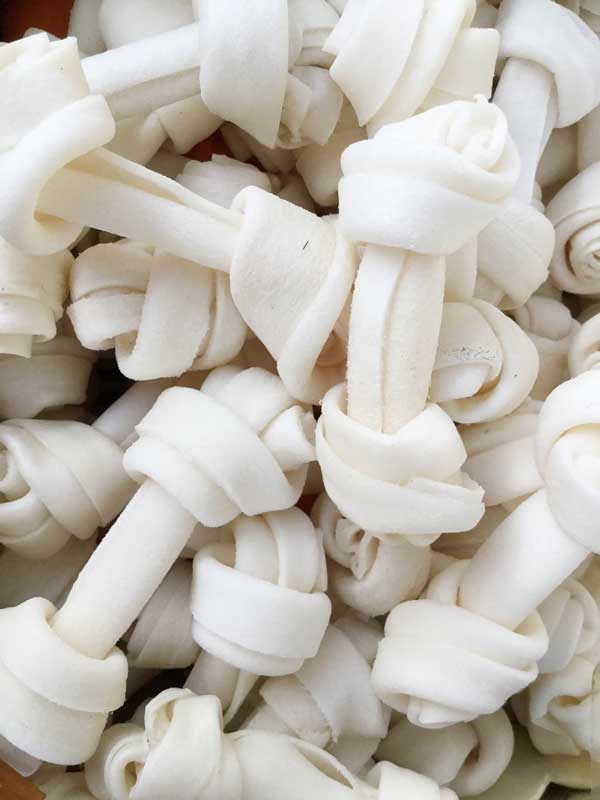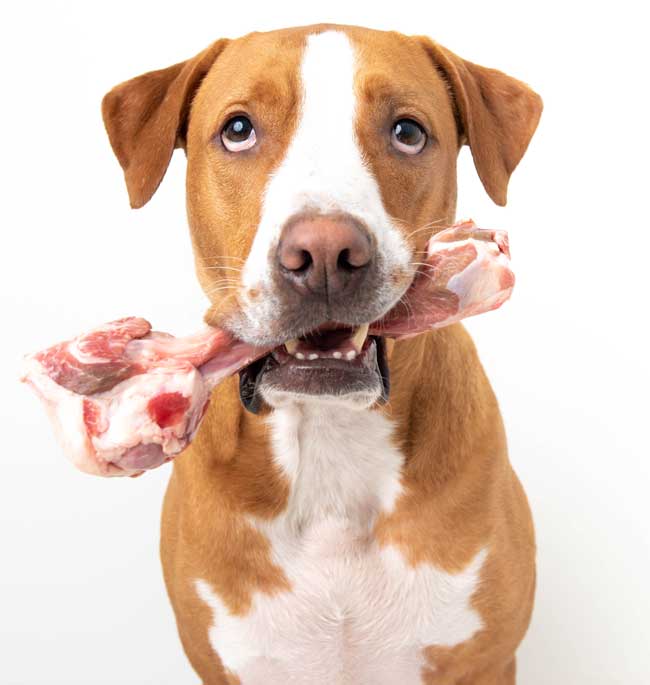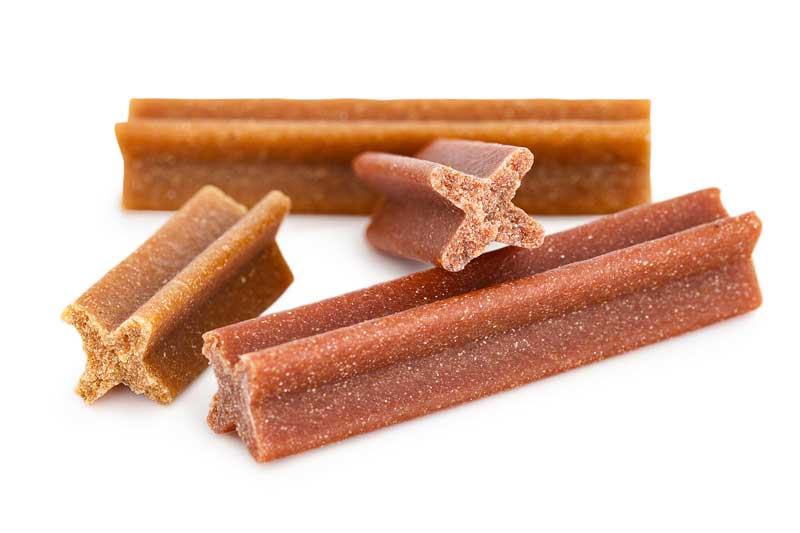Is Rawhide Dangerous for Dogs?
February 14, 2023 | By David Jackson, AllAboutDogFood.co.uk

Rawhide (sometimes labelled as cowhide or beef-hide) is the most popular category of dog chews both in the UK and globally [1]. It is made from animal skin (usually cow but can be any animal) and so is often (mistakenly) thought of as a 'natural' product.
Rawhide comes in all sorts of forms - it's most commonly seen as a pale brown, hard sheet, often folded or rolled into appealing shapes like bones, knots or sticks. Alternatively, rawhide can be pressed or extruded into just about any shape and can be dyed any colour in the rainbow.
Beneath the pretty shapes and colours, though, rawhide is highly controversial due to the way it is made and the significant harm it can cause to dogs.
What is rawhide?
While not all rawhide is made in the same way, most from China, India, Thailand, Brazil etc (which accounts for the vast majority of the supply [2]) is produced using similar techniques.
Rawhide starts out as an animal skin. Most hides are taken directly from the slaughterhouses and preserved in a high-salt brine. They may remain at this stage for some weeks or even months and while the brine does help to slow their decomposition, it does not stop it and many hides will be in varying states of decay by the time they are finally processed.
 Once the hide arrives at a tannery, it is rinsed and treated with lime to help separate the fat from the skin. The hair is then removed by chemical and physical processes before being rinsed again. Once the hide arrives at a tannery, it is rinsed and treated with lime to help separate the fat from the skin. The hair is then removed by chemical and physical processes before being rinsed again.
Next the hide is treated with more chemicals that puff the hide, making it easier to split into its two constituent layers. The outer layer will be tanned to produce leather while the inner layer is what will go on to make rawhide (or, alternatively, products like gelatin, cosmetics and glue).
Inner layers destined to become rawhide are then typically washed and may be whitened using a solution of hydrogen peroxide, bleach or other chemicals. This step also helps to remove any unpleasant stains or odours that might be present after the earlier steps.
The rawhide may then be preserved, coloured and/or flavoured, often using artificial additives.
And then the final product can be folded, pressed or extruded into the bone shapes, rolls, knots and chew sticks that we're familiar with.
Pros of rawhide
Rawhide is cheap, it's extremely widely available, it is heard wearing and it may help a little to keep your dog's teeth clean - although probably not as well as most other chew types.
Cons of rawhide
Obstruction risk
If your dog swallows large pieces of rawhide, they can get stuck in the esophagus or lower in the digestive tract.
One study assessed that as little as 14% of some raw hides may be digestible by a dog's stomach [3].
Due to their indigestibility, large pieces of rawhide can get lodged in the stomach or intestines - sometimes for weeks or even months - and can cause significant gastrointestinal issues. In some cases, rawhide obstructions require emergency abdominal surgery to remove the blockage and if it doesn't come in time, dogs can die.
 Harmful chemicals Harmful chemicals
As we discussed above, rawhide production is generally far from what you would call 'natural'. In many cases, the final product has been subjected to all sorts of potentially harmful chemicals. If you shop carefully, you might be able to find rawhide chews produced in reputable countries that are not chemically treated but even then, you still have the dangers above to contend with.
Animal and worker welfare
Unfortunately, many of the top rawhide producing countries are associated with poor animal welfare and work safety standards. There are no shortage of accounts of leather industry workers in these countries being directly exposed to harmful chemicals on a daily basis, sometimes without any safety equipment at all. While these issues do not affect the quality of the rawhide itself, there are plenty of alternative chews whose production does not result in the unnecessary suffering of the people that make them or the animals they come from.
What can I give my dog instead of rawhide?
There are loads of great non-rawhide options out there! All of the below are both more healthy and more natural than rawhide:
 Recreational Bones Recreational Bones
Our top picks for dog chews are raw, recreational bones. Unlike the typically softer, highly nutritious meaty bones that might form part of a dog's day-to-day meals, recreational bones are more about entertainment, exercise and teeth cleaning. Recreational bones are available from dozens of raw pet food producers. You can get them direct from butchers or in frozen form from pet shops. Unlike cooked bones, raw bones don't tend to splinter and since they are easy for your dog to digest than rawhide, the risk of any digestive problems is much much lower.
Natural dried meat products
Of course, raw bones aren't for everyone so the next best choice would be natural dehydrated meat products. These can come in many forms from duck necks and beef trachea to pizzle sticks and ox tails. Dired meat products do not last as long as a rawhide chew, but they do provide safe chewing activity and will also provide some good bio-appropriate nutrition to boot.
Antlers
Deer antlers have become increasing popular chew choices of late but they are very hard and in some cases can break the dog's teeth so use with some caution.
'Rawhide-free' rawhide
Due to the growing awareness of the dangers of rawhide, a number of products that look very similar to rawhide but are labelled as rawhide-free have come to market. Unfortunately though, in a study carried out in the US, many of these products were found to actually be rawhide [4]. Our advice - if it looks like rawhide, give it a miss.
 Dental chews Dental chews
Dental chews like Pedigree Dentastix, Purina Dentalife and so on are incredibly popular amongst dog owners as dogs love them and they supposedly help clean teeth. Unfortunately, the ingredients they are made from are often nutritionally very poor and their ability to keep teeth clean is also hotly disputed. As with all dog foods and treats, always check the ingredients before giving dental chews to your dog.
In short...
As far as we're concerned, the potential hazards of rawhide coupled with the difficult ethical questions surrounding its production could never be outweighed by its pros. There are no shortage of fantastic alternatives that are less dangerous, healthier and more ethical so we suggest doing your dog a favour and leaving rawhide well alone.
References
- American Pet Products Association (2013) National Pet Owners Survey, pp. 89-91. Schaumburg, IL.
- Rawhide export data of World. Volz.com, Feb 2023. Link
- In vitro disappearance characteristics of selected categories of commercially available dog treats. M R C de Godoy et al. Journal of Nutritional Science, 2014. Link
- Microscopic examination of dog chews: correlation of histological findings to product labeling.A W Stern & L A Martin. Journal of Histotechnology, Vol 44, 2021. Link
|
Jim POWERS •one year ago
This by product should be banned. This is what remains from the tanning leather products. The amount of chemicals its been through is a joke. Then it goes through even more.Elodie •2 years ago
I feel like you've oversimplified the study quoting the 14% rawhide digestibility just a tad, as that study then goes on to say that the same rawhide then had a 77% digestibility rate at the intestinal phase, and the other two rawhides were 73% and 41% digestible at the gastric phase and 99% digestible at the intestinal phase. This is significantly more than some of the 'meat products' tested. The study suggests that rawhides digest slowly so are less suitable for dogs that take big bites and swallow whole pieces, in which case it is up to the owner to choose a chew appropriate for their dogs chewing needs; however they do ultimately digest as much as, or more than, some of the other dental, chew and meat products listed. This study also lists bone as the least digestible of all the treats tested, whereas you claim it is easier to digest; 6-8% at the gastric phase, and 10-27% at the intestinal phase. Bones also come with their own risks; being very hard, extreme chewers risk breaking teeth. I think that ultimately rather than vilifying any one chew and making owners feel guilty for feeding a treat that may be perfectly fine and suited to their dog, an effort should be made to educate owners thoroughly on the properties of each treat so that they may make an educated decision rather than one based in fear. This comes from a long time reader and lover of your fantastic website, but also from a pet shop manager that sources only European chemical free rawhide chews and takes the time to educate owners on what may or may not be suitable for their dog...and has to field many, many comments on how I am selling poison...when in fact I would be happy to feed my dog any of the treats I sell if she actually liked rawhide!!Alana K Elodie
•2 years ago
Elodie
•2 years ago
However, digestibility isn't the only factor - *even* if some rawhide was digestible it doesn't negate the fact that most that are readily available are bleached, chemically treated and then the layers are stuck together. It doesn't matter how digestible they are, I would not want to be giving any dog a highly chemically treated chew. I understand your last paragraph as I work at a small independent natural pet shop where we sell dried animal skin (like this https://www.allaboutdogfood.co.uk/dog-treat-reviews/2324/essential-skin-delights), that I would and have fed my dog as we source them from a reputable company who air dries them and does not use any chemicals. However, we would never sell rawhide even if it was European and chemical free due to the fact that customers could easily confuse our "safe" rawhide with other more readily available "not safe" rawhide.kche8663 Alana K
•7 months ago
Alana K
•7 months ago
I've been going down a deep rabbit hole trying to figure this out but do you know how all the brands / stores selling natural braids as alternatives to rawhide which are also made out of cow hide (for example) manage to make these chews so white and odour free? They all claim to not use chemicals or any artificial in their production... Would love both your perspective if you know :) Thank youAlana K •2 years ago
Brilliant as always! I hope this article will make many owners think twice before giving nasty rawhide, they should be completely banned from pet shops and supermarkets x